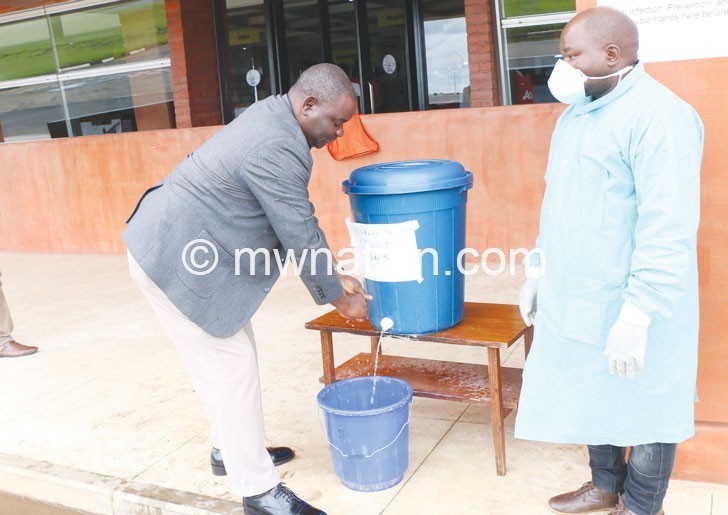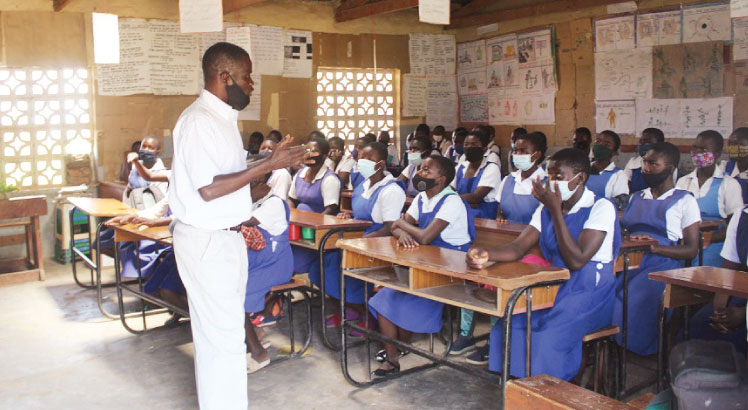It’s not far away from Malawi
It takes just two hours for a planeload of people from South Africa to touch down in Lilongwe or Blantyre. Busloads of travellers commuting between Malawi and the southern tip of Africa need just a day or two to make the trip.
However, it may take coronavirus a similar duration to cross into Malawi from Nelson Mandela’s ‘rainbow nation’ where the first confirmed case in the Southern Africa Development Community (Sadc) was confirmed in the eastern Kwa Zulu Natal province last week.

“Now the virus is closer to home than we ever imagined. Many Malawians travel to South Africa daily and people of two countries are constantly trading with each,” warns Malawi Health Equity Network (Mhen) director George Jobe. “This means that Malawi should immediately intensify screening not only in airports, but all borders and ports of entry and the screening should not target those in buses and personal cars only, everyone entering the country even on foot.”
South Africa has confirmed some 17 cases, bringing to almost 130 the count of cases confirmed in Africa.
From Wuhan City in Mainland China to the southern tip of Africa, the novel flu-like virus keeps spreading.
As the outbreak continues to break borders beyond east Asia, World Health Organisation (WHO) chief Tedros Adhanom Ghebreyesus says all countries should do more to prevent the spread of the virus and none should sleepwalk into the fatal trap of assuming it won’t be affected.

“Whether we get it wrong or right is in our hands,” he says in an appeal after a new crop of countries confirmed cases of infections for the first time. “No country should assume it won’t get cases; that could be a fatal mistake, quite literally. The virus does not respect borders.”
Lessons from Ebola
In 2014, the deadliest Ebola outbreak jolted African nations to form a united front to better prepare and respond to public health emergencies the size of the new coronavirus.
The fast-spreading virus from the war-torn Democratic Republic of Congo, which claimed over 11 300 lives in west African countries Guinea, Liberia and Sierra Leone from 2014 to 2016, shocked African leaders to resolve to long ignored calls to strengthen the continental response to emergencies both big and small.
The birth of Africa CDC, the Africa Union (AU) centres for disease control and prevention, symbolises this growing awareness that an outbreak in one country is most likely to spill across porous borders on the second-most populous continent.
However, countries with shaky, underdeveloped healthy systems are particularly vulnerable to Ebola, coronavirus and other outbreaks that often spread at the speed of flights in the African skies.
As African governments increasingly relax trade and travel controls in line with the AU Agenda 2063, the necessity to ramp up cooperation and investment for concerted disease prevention and control is increasingly unmistakable.
Free movement of people and goods promoted by AU and Sadc does not only unlock windows for increased trade and sharing innovations, but also highly infectious diseases.
Africa CDC director John Nkengasson says increased air traffic between China and Africa increases the risk of spreading coronavirus traced to an animal market in Wuhan.
“Ethiopia alone counts about six flights that leave Addis Ababa every day. Knowing how quickly the virus spread across the world, there is no doubt that the continent is at high risk because of the large movement of people between Africa and China,” he says.
Nkengasson is leading the continent’s efforts to stop the transmission of the virus which has affected nearly 118 000 and killed about 3 400 since December.
On February 14, Egypt became the first African country with a confirmed case of coronavirus.
So far, the virus has spread to Algeria, Tunisia, Nigeria, Senegal, Morocco, Burkina Faso, Cameroon, Togo, the Democratic Republic of Congo and South Africa on the African soil.
This presents a new test for the continent rising from the world’s second-largest Ebola outbreak that has been raging in the DRC since August 2018. It personifies the severity of infections travel at the speed of transportation infected persons use.
And the economic costs are huge.
The worldwide spread of coronavirus from China has left several planes grounded, shops closed, cities in lockdown and persons under investigation quarantined at home.
The Asian giant is Africa’s main trading partner while students, tourists and conference-goers also travel back and forth.
These ties raise spectre of coronavirus transmission across the continent.
AU chairperson Moussa Faki Mahamat says the “human tragedy” is “already paralysing economic activities”.
“We are feeling the effects already, because China, one of Africa’s economic partners, is affected. If we do not take urgent actions the socio-economic effects will be very huge on Africa and the rest of the world,” he told African ministers of health during an emergency meeting in Addis Ababa, Ethiopia.
Last month, Malawi’s Minister of Health Jappi Mhango attended the meeting in the Ethiopian capital to assess the continent’s war on the superbug which spreads through infected droplets released when sneezing, talking and breathing.
He explains: “While all countries that are reporting cases are of interest to us, South Africa is of greater interest considering the amount of traffic between the two countries. We are monitoring the situation in South Africa to see how the outbreak evolves. So far the outbreak is under control since the cases have only been reported among those people who came from Europe. There is no local transmission of the coronavirus in South Africa.
Since the virus was detected in South Africa two weeks ago, fear is rising that its ripples south of the Sahara Desert could be devastating.
The region plays home to overwhelmed healthcare systems weighed down by a high disease burden, low funding, staff shortfalls, lack of life-saving equipment and stock-outs of essential medicine.
The Lancet has released new evidence ranking most susceptible African countries based on air travel from affected areas in China and the capacity of individual African countries to manage an outbreak.
According to the peer-reviewed medical journal, air travel data alone suggests—in order of decreasing likelihood—that Egypt, Algeria, South Africa, Nigeria and Ethiopia have the highest “importation risk”. Cairo International Airport in Egypt receives the most travellers from Chinese hotspots with active transmission.
However, WHO assessments show African countries’ overall readiness for the virus was an estimated 66 percent, owing to fragile healthcare systems in many countries.
Dr Matshidiso Moeti, WHO regional director for Africa, says: “WHO finds there are critical gaps in readiness for countries across the continent.
“We need urgently to prioritise strengthening the capacities for countries to investigate alerts, treat patients in isolation facilities and improve infection prevention and control in health facilities and in communities.”
Africa now has 28 laboratories capable of detecting coronavirus—up from just two at the start of the outbreak.
However, Malawians tested for a possible coronavirus infection will have to wait at least two days for results from specialised laboratories in South Africa and DRC.
“The threats posed by Covid-19 has cast a spotlight on the shortcomings in health systems in the African Region,” says Moeti. “Countries must invest in emergency preparedness. This investment is worthwhile when you consider the cost of responding to outbreaks, which for the 2014 Ebola outbreak was estimated at close to $3 billion.”
When, not ifs
The UN health agency pledges to support African countries’ preparedness and response strategy Mhango endorsed in Ethiopian capital. It has deployed over 40 experts to 10 countries to support coordination, treatment, infection, prevention and control, community engagement, surveillance and laboratory disease control.
Meanwhile, existing preparedness efforts are paying off, with the DRC and Africa CDC regional coordinating centre for Southern Africa, located at Zambia National Public Health Institute in Lusaka , building on the heightened Ebola response to better diagnosis of the new virus.
“Most of these countries now have partner coordination structures in place, points-of-entry screening has been strengthened, particularly at major airports, and isolation units have been upgraded to manage suspected cases,” WHO reports.
Dr Charles Mwansambo, chief director at the Ministry of Health in Lilongwe, says the country has intensified the screening of travellers from high-risk countries and quarantining of cases with high body temperature and signs of infection
“For weeks, we have been saying the virus is in China, South Korea, Iran and Italy. It is now on the continent we call home. Government has put in place mechanisms to better protect people in the country, but some measures involve behavioral change, including washing hands with soap,” he explains.
Jobe warns Malawi to stop doing business as usual as “coronavirus is almost here”.
As southern Africa braces for the worst to come, Malawi and its neighbours need to act with urgency and decisiveness as it no longer a question of ‘if this will happen’, but rather ‘exactly when this will happen’ and ‘how many people will have severe illness’. Ghebreyesus warns: “The increasing signs of transmission outside China show that the window of opportunity we have for containing this virus is narrowing.”





